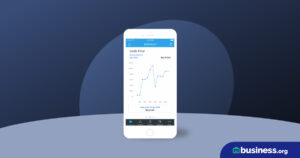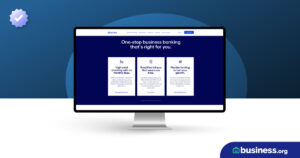💸 See if your business qualifies for a tax credit worth up to $26k per employee. 📞 Call Now: 855-979-9597
What Is Day Trading?: A Risky Investment Strategy with Little Payoff
We are committed to sharing unbiased reviews. Some of the links on our site are from our partners who compensate us. Read our editorial guidelines and advertising disclosure.
Day trading, at its most simple, is just buying and selling (or selling and buying) stocks within the same day. And according to some internet personalities (and tacky signs around your town), day trading is an easy way to make money on the stock market.
Unfortunately, it’s not actually that easy. In fact, you can make money from day trading―but the reality is that you’re far more likely to lose money.
In this guide, we’ll explain how day trading works, unpack the risks, and point you to some alternative stock market strategies.
Day trading 101
As we said up top, day trading―also called intraday trading, if you want to feel fancy―is a simple concept. All you’re doing is buying securities (like stocks) and then selling them within a brief period of time (usually the same trading day).
In theory, this practice allows you to take advantage of small (and occasionally big) fluctuations in the stock market. You’re not expecting any single day trade to make you rich, but you’re hoping to make enough small gains on enough trades that you’re turning a tidy profit.
Note that you don’t have to limit yourself to stock trading. You can trade stocks, yes, but you can also trade options, futures, and other types of securities. You can even do Forex trading, or trading currencies on the foreign exchange market.
Likewise, you can trade on various stock exchanges and markets, such as the New York Stock Exchange (NYSE), Nasdaq, or the forex market.
As with any kind of investing, you can use several different strategies for your trading.
For example, you could just look for fluctuations in prices. You could watch the news and anticipate price movement and market conditions based on current events. You could try some kind of technical analysis to figure out an ideal trading plan.
Whatever trading system you land on, you’ll still be trying to get many small wins rather than one big windfall.
But should you get started with day trading at all?
By signing up I agree to the Terms of Use and Privacy Policy.
Day trading pros and cons
As with most things, day trading has its pros and cons. We’ll start with the pros.
First, it doesn’t take much to get started. As long as you have internet access and a trading account (any of the best online brokers for stock trading will do), you can get started.
And second, day trading has the potential to make you a lot of money. You can find plenty of traders who brag about making hundreds of thousands of dollars with their trading plan. Which, you know, sounds pretty great to most of us.
Now the cons.
As we just said, you don’t need much more than an internet connection to start as a day trader. But to actually make any kind of reasonable profit as a trader, you’ll actually need lots of capital. Because sure, you can get started with cheap penny stocks―but if you ever want to make a living from your trading, you’ll need a lot of stocks (or other securities) to trade.
And trading all those stocks will take more work than you might think. Yes, you’re just clicking buttons on an app. But if you’re trying to turn a profit, you’ll have to keep a close eye on the markets (and potentially the news, since that may inform your day trading strategy), and you’ll have to press those buttons at just the right time. So if you’re hoping to make money, you’ll be glued to that screen. It’s not the kind of thing that works well as a side hustle while you run your business.
If we’re being honest, though, day stock trading doesn’t really work at all in most cases. It’s a hugely risky practice that can easily lead to you losing the money you start with―and likely more than that, depending on your trading style.
Day trading risks
You’ve probably seen a famous day trader or ten insist that the risks of day trading are overstated.
So how risky is day trading stocks really? Pretty darn risky. In fact, we really can’t overstate how risky day trading is.
In one 2011 study, economists looked at 14 years’ worth of data from the Taiwanese stock market. They found that, in that time, only 1% or so of traders consistently turned a profit with day trading.1 That’s, well, not great. It’s incredibly difficult to be a successful day trader.
It makes sense, though. Many studies have found that people are terrible at picking stocks. For example, British researchers found that you’re better off randomly choosing stocks than actively choosing stocks.2 (Fun fact: They used digital monkeys for this study.)
It doesn’t matter if you’re an experienced trader, either. More than one study has shown that diverse index funds have consistently done better than hand-picked stocks.3
And keep in mind, you may very well turn a profit in the short-term. It happens. But just like with gambling, that short-term profit often encourages traders to take bigger risks―until they lose it all.
Now, you’ll have to judge your risk tolerance for yourself. But we have to say, a 1% chance that you’ll make any kind of a profit? There are so many better ways that you could spend that money (like building your business, or even putting it into a high-yield savings account).

Browse hundreds of loan options, custom-tailored to your business and budget needs, from a single, simple platform.
How to start day trading
So with all that said, how do you actually get started day trading?
Don’t.
Seriously, we strongly advise that you avoid day trading. As we said above, you will almost certainly lose money (even if you make money in the short term).
There’s a reason that the U.S. Securities and Exchange Commission’s most comprehensive article about day trading is called “Your Dollars at Risk.” Even its brief definition of day trading calls it “extremely risky” with the potential for “substantial financial losses in a very short period of time.” (And keep in mind, this is coming from a government organization that says you should invest to become more financially secure.)
In other words, it’s not worth risking your money on day trading.
Look, if you really want to pull a Han Solo (“Never tell me the odds!”) and ignore the stats, you can do that. We don’t advise it, but you can. You can use any trading platform to get started with day trading. (Just watch out for platform fees.)
But there are better, smarter, more profitable ways to invest in the stock market.
Day trading alternatives
Look, we know that any stock market investment comes with risk. You can try to calculate the future value of an investment, but it’s never a guarantee.
That said, day trading remains one of the riskiest ways to invest. So if you do want to invest in the stock market, we suggest you go with a different trading strategy.
In fact, we recommend pretty the polar opposite of day trading: index funds.
With index funds, you’re not hand-selecting stocks at all. Instead, your fund will usually match a certain stock index (like the S&P 500). That diversity makes them much less risky than day trading.
You won’t be quickly buying or selling, either. Index funds are designed for long-term returns. Which (bonus!) frees up your time to focus on your business and other pursuits.
Of course, index funds are only one investing option. You can learn more about other options in our guide to investing in stocks.
The takeaway
Day trading lets you to take advantage of small price changes in the stock market to make big profits―at least in theory. In practice, studies show that it’s an easy way to lose money.
So while you certainly can choose to day trade your money away, we strongly suggest you don’t. There are smarter ways to be an investor.
Ready to get started on the stock market (hopefully not through day trading)? Check out our rankings of the best investment apps to find the right brokerage account for you.
Disclaimer
At Business.org, our research is meant to offer general product and service recommendations. We don't guarantee that our suggestions will work best for each individual or business, so consider your unique needs when choosing products and services.
Sources
1. Berkeley, “The Behavior of Individual Investors.”Accessed July 10, 2020.
2. Business Insider, “Monkeys Are Better Stock Pickers Than Fund Managers: Experiment.” Accessed July 10, 2020.
3. CNBC, “Active Fund Managers Trail the S&P 500 for the Ninth Year in a Row in Triumph for Indexing.” Accessed July 10, 2020.





